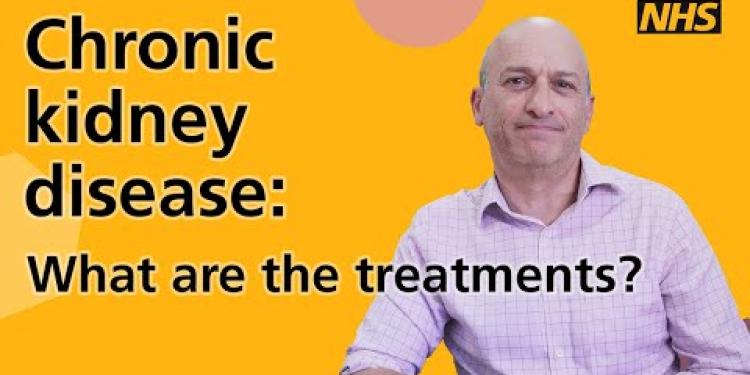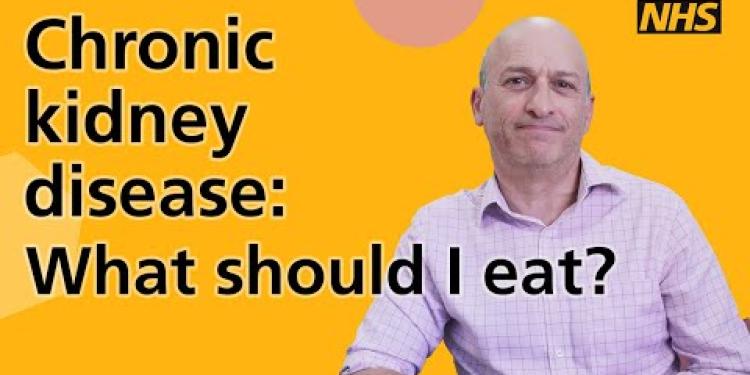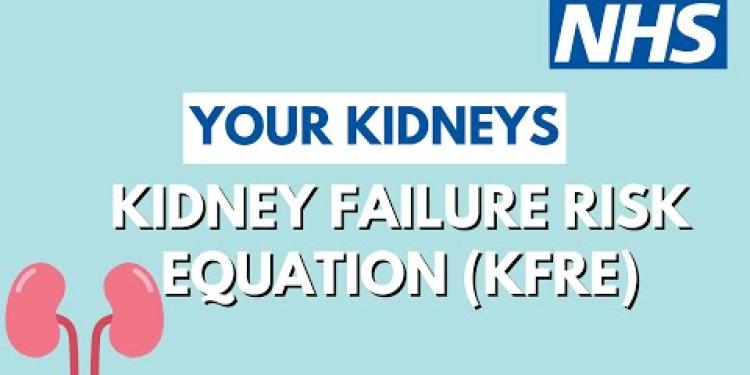Important Information On Using This Service
- Ergsy carefully checks the information in the videos we provide here.
- Videos shown by YouTube after a video has completed have NOT been reviewed by ERGSY.
- To view, click the arrow in the center of the video.
Using Subtitles and Closed Captions
- Most of the videos you find here will have subtitles and/or closed captions available.
- You may need to turn these on and choose your preferred language.
Turn Captions On or Off
- Go to the video you'd like to watch.
- If closed captions (CC) are available, settings will be visible on the bottom right of the video player.
- To turn on captions, click settings.
- To turn off captions, click settings again.
Find A Professional
What Causes Chronic Kidney Disease?
Hypertension
High blood pressure, or hypertension, is a significant cause of chronic kidney disease (CKD). When blood pressure is consistently too high, it can damage the blood vessels in the kidneys. Over time, this can reduce their ability to filter waste and excess fluids from the blood, leading to CKD. Managing blood pressure through medication, diet, and lifestyle changes is critical to preventing or slowing the progression of kidney disease.
Diabetes
Diabetes, particularly type 2 diabetes, is one of the leading causes of CKD in the UK. High blood sugar levels can damage the kidneys over time, impairing their ability to function properly. Poorly controlled diabetes can lead to diabetic nephropathy, a condition that affects the kidneys and can progressively worsen, resulting in CKD.
Genetic Factors
Genetic predispositions can also play a role in the development of CKD. Conditions such as polycystic kidney disease (PKD) are inherited and can cause the formation of cysts in the kidneys, leading to impaired kidney function over time. If you have a family history of kidney disease, it is important to discuss this with your healthcare provider, who may recommend regular monitoring for early signs of kidney issues.
Glomerulonephritis
Glomerulonephritis is a group of diseases that cause inflammation and damage to the kidney's filtering units (glomeruli). This condition can be triggered by infections, autoimmune diseases, or other unknown factors, leading to CKD. Treatment often involves managing the underlying cause and reducing inflammation to protect kidney function.
Other Risk Factors
There are several other risk factors that can contribute to CKD, including: prolonged use of certain medications (like nonsteroidal anti-inflammatory drugs - NSAIDs), recurrent kidney infections, and prolonged obstruction of the urinary tract due to conditions like kidney stones or an enlarged prostate. Additionally, lifestyle factors such as smoking, obesity, and a diet high in salt can increase the risk of developing CKD.
What Causes Chronic Kidney Disease?
High Blood Pressure
High blood pressure is when the force of the blood against your arteries is too strong. It can harm your kidneys. Your kidneys might stop clearing waste and extra water well. You can control blood pressure with medicine, good food, and healthy habits to keep your kidneys safe.
Diabetes
Diabetes can hurt your kidneys. If your blood sugar is too high and not controlled, it damages the kidneys and they might not work well. It is important to manage diabetes to stop kidney problems.
Family History
Kidney disease can run in families. Some people are more likely to get kidney problems because of their genes. If your family has a history of kidney issues, talk to a doctor. They can check if your kidneys are healthy.
Kidney Inflammation (Glomerulonephritis)
This is a disease that makes kidney filters swell and not work well. It can happen because of illnesses, body’s own attack (autoimmune), or unknown reasons. Treating the cause can protect kidneys.
Other Causes
Some medicines taken for a long time, like painkillers, can hurt kidneys. Infections or blocked urine flow from kidney stones can also cause problems. Smoking, being overweight, and eating too much salt are bad for your kidneys too.
Tools: Use simple reminders or alarms to take medicine. Apps can help track blood pressure and sugar levels. Visual aids or charts make it easy to see what to do.
Frequently Asked Questions
What is chronic kidney disease (CKD)?
Chronic kidney disease (CKD) is a long-term condition where the kidneys do not work as well as they should. It is a gradual loss of kidney function over time.
What are the main causes of chronic kidney disease?
The main causes of CKD include high blood pressure, diabetes, high cholesterol, smoking, obesity, and frequent use of over-the-counter painkillers.
How does high blood pressure cause CKD?
High blood pressure can damage the small blood vessels in the kidneys, reducing their ability to filter waste from the blood effectively.
How does diabetes contribute to CKD?
Diabetes can cause high blood sugar levels, which can damage the kidneys' filtering units over time, leading to CKD.
Can high cholesterol lead to CKD?
Yes, high cholesterol can lead to atherosclerosis, which can reduce blood flow to the kidneys and impair their function, contributing to CKD.
How does smoking affect kidney health?
Smoking can damage blood vessels and reduce blood flow to the kidneys, accelerating the progression of CKD.
Is obesity a risk factor for CKD?
Yes, obesity can contribute to conditions like high blood pressure and diabetes, which are major risk factors for CKD.
Can over-the-counter painkillers cause CKD?
Frequent use of over-the-counter painkillers, particularly nonsteroidal anti-inflammatory drugs (NSAIDs), can damage the kidneys and increase the risk of CKD.
What are the symptoms of chronic kidney disease?
In its early stages, CKD may not cause noticeable symptoms. As it progresses, symptoms can include fatigue, swollen ankles, shortness of breath, blood in urine, and frequent urination.
Can chronic kidney disease be prevented?
While CKD cannot always be prevented, managing risk factors like blood pressure, blood sugar, and maintaining a healthy lifestyle can reduce the risk.
How is CKD diagnosed?
CKD is usually diagnosed through blood tests that measure creatinine levels, urine tests for protein, and imaging tests to assess kidney structure.
What treatments are available for CKD?
Treatment focuses on managing symptoms and slowing progression, including medications for blood pressure and diabetes, lifestyle changes, and in severe cases, dialysis or kidney transplant.
How does a healthy diet support kidney health?
A healthy diet low in salt, protein, and processed foods can help manage blood pressure and blood sugar levels, reducing the burden on the kidneys.
What role does exercise play in preventing CKD?
Regular exercise can help maintain a healthy weight, lower blood pressure, and improve overall health, all of which can reduce the risk of developing CKD.
Are there any support groups for people with CKD in the UK?
Yes, there are several support groups and organisations for people with CKD in the UK, such as Kidney Care UK and the National Kidney Federation. They provide resources, support, and advocacy.
What is chronic kidney disease (CKD)?
Chronic kidney disease (CKD) means your kidneys do not work well for a long time. Kidneys help clean your blood and make urine. If you have CKD, your kidneys need extra help.
Here are some tips to help understand CKD better:
- Ask a doctor or nurse to explain what CKD means.
- Use pictures or drawings to help you learn.
- Ask a friend or family member to read with you.
Chronic kidney disease (CKD) is a long-lasting illness. It happens when the kidneys do not work properly. The kidneys slowly stop working over time.
What causes long-term kidney problems?
The main reasons for CKD are:
- High blood pressure
- Diabetes
- High cholesterol
- Smoking
- Being very overweight (obesity)
- Using a lot of pain medicine you can buy at the store
If you need help reading, you can try using a ruler or your finger to follow the words. You can also ask someone to read with you.
How does high blood pressure cause CKD?
High blood pressure means your heart has to work hard to move blood around your body. This can hurt the tiny filters in your kidneys.
When the filters are hurt, your kidneys can't clean your blood well. This can lead to a problem called CKD or chronic kidney disease.
To help understand, you can:
- Look at pictures or videos about high blood pressure and kidneys.
- Ask a helper or a friend to explain it using simple words.
High blood pressure can hurt the tiny blood vessels in the kidneys. This makes it hard for the kidneys to clean waste from the blood properly.
If you find reading hard, you can:
- Use pictures to help understand the words.
- Ask someone to read the text with you.
- Break down the sentence into smaller parts.
How does diabetes make kidney problems worse?
Diabetes can make your blood sugar too high. This can hurt the kidneys, which clean the blood. Over time, this can cause kidney problems.
Can high cholesterol make kidney problems worse?
Cholesterol is a fatty stuff in the blood. If you have too much, it can be bad for your heart.
Too much cholesterol can also hurt your kidneys. The kidneys clean your blood. If they get hurt, it can be hard for them to work properly.
If your kidneys are not working well, it is called CKD, which stands for Chronic Kidney Disease.
To help, eat healthy foods, exercise, and see your doctor for advice. There are also apps and tools that can help you track your food and exercise.
Yes, too much cholesterol can block blood flow. This can stop your kidneys from working well. It can lead to kidney disease.
What does smoking do to your kidneys?
Smoking is bad for your body. It can hurt the tubes that carry blood. This means less blood goes to your kidneys. When this happens, kidney problems can get worse faster.
If you want to stop smoking and keep your kidneys healthy, try using supportive tools like talking to a doctor, using apps to help quit, or joining a support group. These can make it easier to stop smoking.
Does being very overweight make kidney problems more likely?
Yes, being very overweight can lead to health problems like high blood pressure and diabetes. These problems can make it more likely to have kidney disease.
Can store-bought pain medicine hurt kidneys?
Some pain medicine you buy from the store might hurt your kidneys if you use them too much.
- "Kidneys" are parts of your body that help clean your blood.
- "Pain medicine" helps when you feel hurt or sick.
If you're worried or use pain medicine a lot, ask a doctor or a nurse for help.
Use tools like pictures or videos to understand better what's said here.
Taking too many pain pills from the store, especially ones called NSAIDs, can hurt your kidneys and might lead to kidney disease.
What happens when your kidneys are not healthy?
Here are some signs to look out for:
- You feel very tired.
- Your body and face might be puffy.
- You need to pee more often, especially at night.
- Your pee might be foamy.
- You don't feel like eating.
- You might feel itchy.
- You could have muscle cramps.
If you notice these, talk to a doctor or a grown-up who can help. Drawing a picture of how you feel can also help you explain your symptoms.
At first, kidney problems might not make you feel different. But as it gets worse, you might feel very tired. Your ankles might get puffy. It could be hard to breathe. You might see blood when you pee. You could also need to pee a lot more often.
Can we stop kidney disease from happening?
Sometimes, we can't stop CKD (a kind of kidney problem), but there are things we can do to lower the chance. We can keep our blood pressure and blood sugar at good levels. We can also live in a healthy way.
How do doctors find out if you have CKD?
Doctors find out if you have CKD by doing some tests. They check your blood to see how much creatinine is there. They also test your pee for protein. Sometimes, they take pictures of your kidneys to see how they look.
What treatments can help kidney disease?
If your kidneys are not working well, it is called kidney disease.
There are different ways to help:
- Medicine: Doctors can give you medicine to help your kidneys.
- Healthy Eating: Eating good food can keep your kidneys healthy.
- Exercise: Moving your body can help you feel better.
- Regular Check-Ups: Go to the doctor to check your kidneys.
Ask a doctor or nurse if you need help understanding this information. You can also use software or apps that read the text out loud or help you focus while reading.
Doctors help by giving medicine and telling you important ways to live healthily. They want to help with problems like high blood pressure and diabetes. It is important to eat well and exercise. If the kidneys get very sick, doctors might use special machines to clean the blood or even give a new kidney.
How does eating healthy help your kidneys?
Eating good food can help your kidneys stay strong. It is important to take care of your kidneys. They clean your blood and help make sure your body works well.
Here are some tips to help your kidneys:
- Drink lots of water.
- Eat fruits and vegetables.
- Avoid too much salt.
- Choose whole grains like brown bread and rice.
- Stay away from sugary drinks.
If reading is hard, you can:
- Listen to audiobooks.
- Use picture stories.
- Ask someone to read with you.
Eating healthy food is good for you. Try to eat less salt, less meat, and not too many foods from a factory. This will help take care of your heart, sugar levels, and kidneys.
How does exercise help stop kidney disease?
Exercise is important for keeping kidneys healthy. It helps your body stay strong. When you move and play, your body works better. This can help stop kidney disease.
Here are some tips to help you:
- Go for a walk or run every day.
- Play sports like football or basketball.
- Ride your bike outside.
- Dance to your favorite songs.
Using a calendar to track your exercise can also help you stay active.
Doing exercise is good for you. It helps you stay at a healthy weight. Exercise also makes your heart strong. This can help stop you from getting sick.
Can people with CKD find help groups in the UK?
Yes, if you have CKD (Chronic Kidney Disease), there are groups in the UK that can help you. These groups let you talk to other people with CKD. You can share how you feel and get advice. You can ask your doctor about these groups. You can also search online for CKD support in the UK. These groups can be very helpful if you want to talk and learn more.
Yes, there are groups that help people with CKD in the UK. These include Kidney Care UK and the National Kidney Federation. They give help, information, and speak up for people.
Useful Links
Useful links from: Living with early stage kidney disease
- NHS - Chronic Kidney Disease Official NHS page providing information on chronic kidney disease, including symptoms, diagnosis, treatment, and living with the condition.
- Kidney Care UK Kidney Care UK is a leading kidney patient support charity in the UK, offering advice, support, and information for those living with kidney disease.
- British Kidney Patient Association The British Kidney Patient Association provides practical, emotional, and financial support to individuals affected by kidney disease and their families.
- Kidney Research UK Kidney Research UK is the leading charity dedicated to kidney health and research in the UK, offering resources and support for patients with kidney disease.
Useful links from: Chronic kidney disease: What are the treatments?
- NHS - Chronic Kidney Disease: Treatment An overview of treatment options for chronic kidney disease, including lifestyle changes, medications, and when dialysis or a kidney transplant may be necessary.
- Kidney Care UK - Living with Kidney Disease Information provided by Kidney Care UK on various treatments for kidney disease, including dietary advice and support for those undergoing dialysis or a transplant.
- The Kidney Fund - Treatments for Kidney Disease A guide from The Kidney Fund on the different treatment options for kidney disease, including a focus on patient support and education.
- British Kidney Patient Association - Treatment Information Detailed information on treatments for kidney patients, provided by the British Kidney Patient Association with focus on patient-centered care.
Useful links from: What should I eat to help with chronic kidney disease?
- NHS - Chronic Kidney Disease Official NHS page providing comprehensive information about chronic kidney disease, including dietary advice for managing the condition
- Kidney Care UK - Living with Chronic Kidney Disease Kidney Care UK offers guidance on living with kidney disease, including specific dietary tips and nutrition advice for patients
- British Kidney Patient Association - Diet and Nutrition The British Kidney Patient Association provides resources and advice on food and diet for individuals with kidney disease to help manage their condition
- National Kidney Federation - Diet and Nutrition Advice National Kidney Federation's section on diet and nutrition, offering useful insights and recommendations for kidney patients
Useful links from: What is my risk of kidney failure with CKD (chronic kidney disease) | UHL NHS Trust
- What is Chronic kidney disease (CKD)? An overview of Chronic Kidney Disease (CKD) provided by the NHS, including symptoms, causes, and treatments.
- Chronic Kidney Disease (CKD) A comprehensive guide to Chronic Kidney Disease (CKD) from Kidney Care UK, a leading kidney health charity in the UK.
- Understanding CKD Risk Factors and Progression Detailed information on the risk factors, progression, and impact of CKD from Kidney Research UK, a leading kidney research charity.
- Kidney failure information, support resources Information and support resources on kidney failure and CKD from the British Kidney Patient Association (BKPA).
More Videos of Interestdiagnosis
Have you found an error, or do you have a link or some information you would like to share? Please let us know using the form below.
- Ergsy carfully checks the information in the videos we provide here.
- Videos shown by Youtube after a video has completed, have NOT been reviewed by ERGSY.
- To view, click the arrow in centre of video.
- Most of the videos you find here will have subtitles and/or closed captions available.
- You may need to turn these on, and choose your preferred language.
- Go to the video you'd like to watch.
- If closed captions (CC) are available, settings will be visible on the bottom right of the video player.
- To turn on Captions, click settings .
- To turn off Captions, click settings again.




